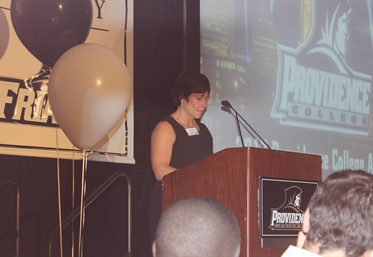USA 1990: Cindy Curley
USA 1990: Cindy Curley
Curley cued goals, assists, points, records

 Curley was inducted into the Providence College Athlete Hall of Fame for ice hockey in 2013.
Curley was inducted into the Providence College Athlete Hall of Fame for ice hockey in 2013.
Not to mention her record nine points in a single game (5 goals, 4 assists vs. Norway), her five goals in a game (tied). And then there are her six points in one period (4+2) and four goals in a period (tied).
“I am surprised those records still stand,” she admitted 23 years later. “I’m sure at some point somebody’s going to beat those records. There are just so many great players. I’ve watched a lot of the players who are out there today, and they’re just tremendous. The level of play has been elevated. I think I was somewhat lucky that maybe there weren’t as many great players then as there are now.”
Perhaps, but Curley was certainly one of the greats in 1990. She was 26 years old at the Ottawa worlds that year, in her prime and leading the United States to the gold-medal game. She could skate and shoot, but most of all she had great hockey sense.
“I was always just smart enough to get open,” she said with a humble laugh. “With all the great players I had for teammates, I think I had good instincts, but I played with great people who were playmakers.”
Her praise is justified. Consider some of the women she played with in 1990: Cammi Granato, Lisa Brown, Sue Merz, Tina Cardinale.
Curley’s story is not dissimilar to other women of her era. “I grew up in a small town, and we lived on a lake. In the summer we water-skied and in the winter everybody skated,” she began. “My brothers wore hockey skates and I wanted the same skates, so we played hockey. My father played in college. My brothers played. It was just natural that I played as well.”
Continue readingShe fell in love with the game and continued to practice and play, improving every year. When she got to college, there was no reason not to play. “I played at Providence College with some tremendous players, and then when USA Hockey was putting the national team together, I wasn’t ready to give up skating. I had played in Assabet Valley, Connecticut, and we played in national tournaments. I loved it. I loved the competition, the camaraderie with my teammates. In 1987 they were putting all-star teams together. I was fortunate enough that the owners of the Assabet rinks gave us time to practice and play.”
It was through college and good timing that Curley had a chance to play internationally. “USA Hockey had tryouts for the 1990 world championships, and those of us who were lucky enough to make the team played in tournaments. It was so exciting.”
Of course, her recollections from Ottawa are all wonderful, from the games to the fans, to the very existence of the event. “It was a great atmosphere and so many fans. The excitement of the whole tournament and being in Canada which is such a great hockey country, representing your country and meeting players from other countries, was all such a great experience.”
Curley was named to the all-star team as a forward and went home ecstatic by the event's success. “We brought pins home. I think we also got Swatches from Switzerland. I’m dating myself, but they were really popular at the time,” she added with a laugh.
After four more years and two more Women’s Worlds, Curley retired. “I pretty much stopped playing in 1994. I had had some knee surgeries, and I just felt like what I was bringing to the table wasn’t good enough anymore. I just couldn’t play the way I wanted to play or should play.”
Her days in hockey were hardly over, though. “I coached a U19 girls’ team, players who were getting ready to go to college. I sat on the USA Hockey board for ten years, and then the Olympic board, so I tried to give back and help grow the sport. So many people had helped me in my career.”
Curley agrees with what most people see in the current state of the game: optimism in the remarkable development of the sport worldwide; worry that Canada and the U.S. have maintained a significant gap over the rest of the competition.
“I think the opportunity to get an NCAA scholarship at so many more schools now is critical. It allows these athletes to get a great education and continue to play. Clearly the Olympics is also a huge motivator for so many players. And they’re just better athletes. They train so much harder today.”
“At the same time, you get a little nervous because Canada and the United States seem to be so far ahead. I sit on the Olympic board and I get worried that if there’s not enough competition across the board, it may be one of the sports they take another look at. I hope that countries find the funding like USA Hockey does, to support the training and development of these athletes.”
The more countries that invest in the game the better, not only to raise the overall level of the game but also to develop the next Cindy Curley who can one day best her record of nine points in a game. Or tie it, anyway.
Back to Overview
















































